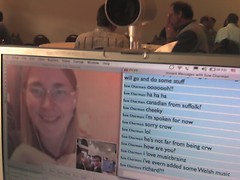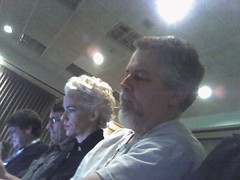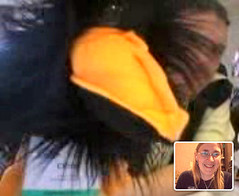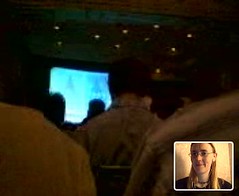One of the things that I find frustrating with most language learning courses is how little thought they put into teaching you how to pronounce words. Learning good pronunciation is essential for you to make any sort of progress with your language – you need to feel confident that you can be understood by other speakers, to be able to read aloud without stumbling over every word.
A tall order? Not really.
They key to pronunciation is listening and speaking. So many books give you a table of letters and words and maybe an audio track of someone speaking those words and they think that's it, that's all they need to do. Unfortunately, half the time their explanations of the sounds leave a lot to be desired and the sound file is about as far from inspiring as it is possible to get. So what do you end up doing? You skip over that chapter entirely and go straight to the first chapter of allegedly interesting stuff.
You have to resist that temptation. Instead, aim to be able to read your target language aloud with some degree of confidence and fluency, no matter whether you understand it or not. Being able to talk out loud will help you learn, so it's worth spending the time to learn pronunciation as thoroughly as you can, and to keep at it even whilst you are learning grammar and vocabulary. In fact, my advice? Never stop practising pronunciation.
Learning your alphabet
Some languages use the same Roman alphabet as we do in English. Some appear to, but either are missing some letters or have letter combinations that are pronounced differently to how you would expect.
Welsh is a great example of this. The Welsh alphabet, for example, has no K, Q, V, X, Z, and it is only recently that J has become part of the alphabet, used only in loan words from English.
However, the differences don't stop there. Welsh has a number of digraphs – two letters which correspond to one sound – which are in some cases very different to English pronunciation: Ch, Dd, Ff, Ng, Ll, Ph, Rh and Th. And then, of course, there are letters which look identical in Welsh to English, but are pronounced differently, e.g. F, which is really a V (FF is an F).
It's a good idea to learn your alphabet thoroughly and be aware of which letters might trip you up in the future.
Learn your А to Я
Of course, some languages don't just have a different alphabet, they have a really different alphabet. Russian, for example, uses Cyrillic, which can totally fry your brain if you let it. Some course books will throw you in at the deep end and give you only phrases in Cyrillic to learn but whilst understanding of the new alphabet is essential, it can be daunting when you're a beginner.
In order to learn that 'Добрый денъ!' means 'Hello!' you have to memorise it by rote, because there's little similarity between Roman and Cyrillic alphabets so there's nothing familiar upon which you could base a guess at pronunciation or translation. There's no way you're going to guess by looking at it that Паслорт is 'Passport' – you have to hear it spoken (it sounds very similar in Russian to the English). There's a fundamental disconnect between what your brain is hearing and what your eyes are seeing, and you have to bridge this gap before you can make good progress with the language.
One way to do this is through transliteration – writing Russian in the Roman alphabet. This renders Паспорт as Pasport, which is instantly recognisable, and Добрый денъ as 'Dobry den' which is very close to how Добрый денъ should be pronounced.
The drawback with transliteration is that although you will end up with a rough idea of what the words might sound like, it won't be accurate and if you rely on transliteration you will learn bad pronunciation habits that you will later have to break – and breaking bad habits is harder than not making them in the first place.
Transliteration can also be used for languages that use a completely different writing system, such as Japanese or Hindi, and it's a reasonable middle step to use whilst you're getting your head round it, but you keep your usage to a minimum and be careful not to mis-learn things.
Phonetics
Some books, such as Berlitz phrase books, have very good phonetic explanations of how to pronounce words, and they give them for every word or phrase in the book. These pocket-sized books are little gems. I have spent hours and hours sitting with my Polish for Travellers book just muttering Polish phrases and trying to get the pronunciation fluid:
Do you have any records by…? – Czy są płyty…? – chi sawng PWIti…?
Can I listen to this record? – Czy mogę przesłuchać tę płytę? – chi MOgeh pshehSWOOhahtsh teh PWIteh?
That's just what I want. – Właśnie to chcę. – VWAHSYñeh to htseh.
Be careful with phonetics though. Some explanations of the 'sounds like' type are subject to the vagaries of accent. For example, the explanation that A is pronounced 'as in grass' is too fuzzy to be useful. Do they mean the short A of the north of England, (rhymes with 'cat'), or the long A of the southern counties, (rhymes with 'car'). And how does your (likely not British) accent affect your pronunciation?
A real, live native speaker
The best way to learn how to pronounce words properly is with the help of a sympathetic and patient native speaker. I was about 22 when I first started learning Polish from a woman that I was working with at the time. She took me through my phrase book and helped me learn my numbers and learn how to speak Polish out loud. I rapidly got to the point where I could read any Polish text with what she told me was a great accent. Sadly, I didn't understand a word of what I was saying, but at least I sounded good.
Audio books and short stories
If you can, find some audio books or short stories online, with a text version, and download them. It doesn't matter if you don't understand what they are about, what matters is that you have an audio file to listen to and the written words to read.
When I was putting together Clwb Malu Cachu, my website for Welsh learners, one of the first things I did was write some short stories and get native Welsh speakers to narrate them for me. Short and sweet, they're not too demanding nor intimidating – perfect for learners who want to improve their pronunciation.
Once you've downloaded some material, I'd recommend listening to each story several times over, and then work on reading them out aloud yourself until you feel comfortable with the sounds.
The sound of music
I started learning Welsh mainly because I had a crush on Gruff Rhys from the Super Furry Animals. (Just don't tell him that, ok?) I would listen to the songs he'd written in Welsh and I'd sing along. Loudly. Torra fy Ngwallt yn Hir was the very first Welsh song I learnt, but as time went on I discovered more and more Welsh music that I liked, which meant more and more lyrics to learn, more and more songs to sing along to.
Again, it didn't matter that I didn't understand what I was singing – in fact, in some cases my lack of comprehension just added to the mystique of lyrics which turned out to be quite banal when translated. Everything just sounds so much better, more meaningful, in Welsh – you can ask for beans on toast in Welsh and it sounds like you're asking for the food of the gods.
So find music in your target language, get a hold of the lyrics, and start warbling. It will do your pronunciation the world of good.
(Note: In theory, TV and radio would also be good places to learn pronunciation, but in practice I've found it to be a bit too daunting. All those people speaking far too fast about stuff you can't understand becomes frustrating instead of educational, so be careful. If you try listening to foreign language radio or watching TV, make sure you don't end up making yourself feel stupid in the process.)
Variety is the spice of life
Whatever you do, don't rely on one tactic for learning pronunciation. Mix and match. Do a bit every day – you'll learn more from working 10 minutes a day than an hour on the weekend. And remember to talk out loud as much as possible. Talk to your cat, talk to your plants, talk to anything that won't point and laugh. Read everything aloud, from the boring pronunciation exercises at the front of your course book to new words in the dictionary to the lyrics of foreign language songs. Listen to everything that you can, podcasts, audio books, music, your friends. Listen as often as you can. Instead of listening to the latest chart-topping hits on your commute to work, listen to stuff in your target language.
Eventually, your tongue will get used to the new sounds and will be able to say the words your eyes are reading with less and less effort. When that happens, you'll see the value in all that effort – you'll be able to read new words and phrases without hesitation, and you'll understand more of what people say to you.









